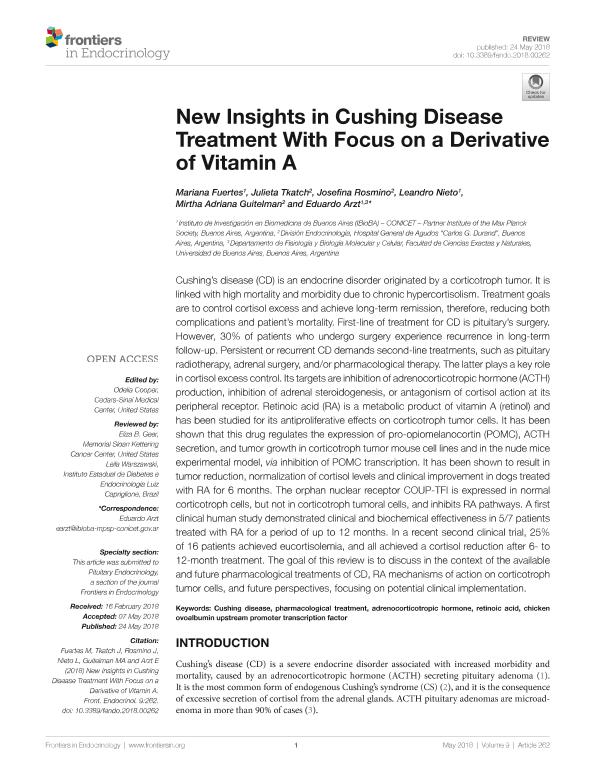Artículo
New Insights in Cushing Disease Treatment With Focus on a Derivative of Vitamin A
Fuertes, Mariana ; Tkatch, Julieta; Rosmino, Josefina; Nieto, Leandro Eduardo
; Tkatch, Julieta; Rosmino, Josefina; Nieto, Leandro Eduardo ; Guitelman, Mirtha Adriana; Arzt, Eduardo Simon
; Guitelman, Mirtha Adriana; Arzt, Eduardo Simon
 ; Tkatch, Julieta; Rosmino, Josefina; Nieto, Leandro Eduardo
; Tkatch, Julieta; Rosmino, Josefina; Nieto, Leandro Eduardo ; Guitelman, Mirtha Adriana; Arzt, Eduardo Simon
; Guitelman, Mirtha Adriana; Arzt, Eduardo Simon
Fecha de publicación:
05/2018
Editorial:
Frontiers Research Foundation
Revista:
Frontiers in Endocrinology
e-ISSN:
1664-2392
Idioma:
Inglés
Tipo de recurso:
Artículo publicado
Clasificación temática:
Resumen
Cushing's disease (CD) is an endocrine disorder originated by a corticotroph tumor. It is linked with high mortality and morbidity due to chronic hypercortisolism. Treatment goals are to control cortisol excess and achieve long-term remission, therefore, reducing both complications and patient´s mortality. First-line of treatment for CD is pituitary´s surgery. However, 30% of patients who undergo surgery experience recurrence in long-term follow-up. Persistent or recurrent CD demands second-line treatments, such as pituitary radiotherapy, adrenal surgery, and/or pharmacological therapy. The latter plays a key role in cortisol excess control. Its targets are inhibition of adrenocorticotropic hormone (ACTH) production, inhibition of adrenal steroidogenesis, or antagonism of cortisol action at its peripheral receptor. Retinoic acid (RA) is a metabolic product of vitamin A (retinol) and has been studied for its antiproliferative effects on corticotroph tumor cells. It has been shown that this drug regulates the expression of pro-opiomelanocortin (POMC), ACTH secretion, and tumor growth in corticotroph tumor mouse cell lines and in the nude mice experimental model, via inhibition of POMC transcription. It has been shown to result in tumor reduction, normalization of cortisol levels and clinical improvement in dogs treated with RA for 6 months. The orphan nuclear receptor COUP-TFI is expressed in normal corticotroph cells, but not in corticotroph tumoral cells, and inhibits RA pathways. A first clinical human study demonstrated clinical and biochemical effectiveness in 5/7 patients treated with RA for a period of up to 12 months. In a recent second clinical trial, 25% of 16 patients achieved eucortisolemia, and all achieved a cortisol reduction after 6-to 12-month treatment. The goal of this review is to discuss in the context of the available and future pharmacological treatments of CD, RA mechanisms of action on corticotroph tumor cells, and future perspectives, focusing on potential clinical implementation.
Archivos asociados
Licencia
Identificadores
Colecciones
Articulos(IBIOBA - MPSP)
Articulos de INST. D/INV.EN BIOMED.DE BS AS-CONICET-INST. PARTNER SOCIEDAD MAX PLANCK
Articulos de INST. D/INV.EN BIOMED.DE BS AS-CONICET-INST. PARTNER SOCIEDAD MAX PLANCK
Citación
Fuertes, Mariana; Tkatch, Julieta; Rosmino, Josefina; Nieto, Leandro Eduardo; Guitelman, Mirtha Adriana; et al.; New Insights in Cushing Disease Treatment With Focus on a Derivative of Vitamin A; Frontiers Research Foundation; Frontiers in Endocrinology; 9; 262; 5-2018; 1-12
Compartir



